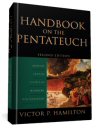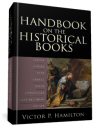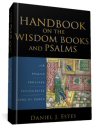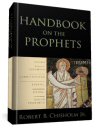Handbook on the Old Testament Series (4 vols.)
Digital Logos Edition
Overview
While many biblical handbooks are on the market, the Handbook on the Old Testament Series (4 vols.) is, arguably, one of the best. This is due undoubtedly to their comprehensive approach and a firm understanding of their audience's needs.
Intended for the seminary student, pastor, and layperson interested in Old Testament exegesis, these handbooks provide a wealth of information while also preparing the reader for further study. This is achieved by providing three essential components. First, matters of introduction, authorship, date, and more, are outlined. Second, an exposition of the book is given. Finally, the authors lay out their interpretive conclusions.
After reading the Handbook on the Old Testament Series (4 vols.), you will come away ready to put your new-gained knowledge to good use with unprecedented access to resources and tools in Logos Bible Software. The powerful search features in your digital library help you locate the specific material relevant to your study. Hours of biblical research can be accomplished with the simple click of a mouse. With lightning-speed searching, instantly-viewable Scripture references, a vast library of resources, and much more, Logos is the perfect software to increase your biblical knowledge.

- Introductions to each book of the Bible
- Extensive bibliographies to further your study
- Includes subject indexes
- Title: Handbook on the Old Testament Series
- Publisher: Baker
- Volumes: 4
- Pages: 2,000
This title is included in the following collections
You can save when you purchase this product as part of a collection.
Baker Ultimate Collection 2022...
$38,273.89$30,599.99

For more than twenty years, Victor Hamilton's handbook has been introducing students to the Pentateuch. In this substantially revised second edition, Hamilton moves chapter by chapter, rather than verse by verse, through the Pentateuch. He examines the content, structure, and theology and provides useful commentary on overarching themes and connections between Old Testament texts. For those who wish to do additional research, each chapter is appended with a bibliography of recent, relevant scholarship.
It is a pleasure to recommend this work as an excellent introduction to the first five books of the Bible. Its sensitivity to the literary structures and emphases in the texts as well as its full awareness of classic and contemporary exegetical issues and scholarship provides an essential tool for introducing students and all interested readers to the fascinating world of the Pentateuch. Scholars in the field will also benefit from Hamilton's presentation of new and original ideas and up-to-date bibliographies.
—Richard S. Hess, Professor of Old Testament, Denver Seminary
Hamilton achieves with apparent ease what so many only attempt. He unites historical study with literary insight; he integrates diachronic critical concerns with synchronic, structurally sensitive insights; and he deftly places his own fresh reading of the texts in conversation with an astonishing range of scholarly literature that represents the full spectrum of research on the Pentateuch. All this is done within a sound theological framework that allows the text to be heard naturally as a rule of faith for the church.
—Lawson Stone, Professor of Old Testament, Asbury Theological Seminary
Victor P. Hamilton (PhD, Brandeis University), now retired, was professor of Bible and theology at Asbury University in Wilmore, Kentucky, for more than thirty-five years. He is the author of a two-volume commentary on Genesis and Handbook on the Historical Books.

From the tumbling walls of Jericho to a Jewish girl who became the queen of Persia, the historical books of the Bible are intriguing and unquestionably fascinating. In this companion volume to his Handbook on the Pentateuch, veteran Old Testament professor Victor Hamilton demonstrates the significance of the messages contained in these biblical books. To do so, Hamilton carefully examines content, structure, and theology using rhetorical criticism, inductive Bible study techniques, published scholarship, archaeological data, word studies, and text-critical evidence. Hamilton details the events and implications of each book chapter by chapter, providing useful commentary on overarching themes and the connections and parallels between Old Testament texts. Using theological and literary analysis, this comprehensive introduction examines historical issues, attempting to uncover and discover their thrust and theological messages. For those who wish to do additional research, each chapter is appended with a bibliography.
[An] excellent introduction. . . . The book is an important addition to the literature on the Old Testament historical books. Hamilton has clearly done his homework and has packaged his findings in good prose and a coherent, readable style.
—Eugene H. Merrill, Bibliotheca Sacra
Professor Hamilton has provided college students and anyone else serious about studying the historiographic books of the Old Testament with an excellent introduction. His careful attention to style and message bring these ancient writings to life.
—Daniel I. Block, Gunther H. Knoedler Professor of Old Testament, Wheaton College
Victor P. Hamilton (PhD, Brandeis University), now retired, was professor of Bible and theology at Asbury University in Wilmore, Kentucky, for more than thirty-five years. He is the author of a two-volume commentary on Genesis and the Handbook on the Pentateuch.

In this work, Daniel Estes introduces you to the Old Testament poetical books—Job, Psalms, Proverbs, Ecclesiastes, and Song of Songs. Each chapter explores one of the five poetical books. Estes first summarizes some of the book's key issues. He then devotes the main portion of the chapter to an exposition of the book, interacting with major commentaries and recent studies. Each chapter concludes with an extensive bibliography, allowing for further exploration.
Within his given format Estes approaches the introductory material straightforwardly, while slightly tweaking his expositional format. He provides full treatments of Job, Ecclesiastes, and the Song of Solomon, but changes slightly the presentation of the Psalms and of Proverbs. In Psalms he identifies ten types of psalms and treats each one according to its form and typical contents. Similarly in Proverbs, Estes identifies topics and synthesizes them into a coherent exposition on the books contents.
This is an eminently readable and useful book for the study of the wisdom books and Psalms. . . . this work opens up ways of studying and understanding them that will take most Christians much farther in their appreciation of these compositions and of the Psalter in which they are found. Estes also skillfully leads readers into a new appreciation for the wisdom books, which are often misunderstood and underappreciated. Students, pastors, and even highly motivated laypeople will find much to treasure in this book.
—David M. Howard Jr., Professor of Old Testament, Bethel Seminary
In this engaging and helpful survey of the types and themes of wisdom literature, Estes . . . provides a generous introduction for readers interested in the interpretation of these books. . . . Estes' survey represents all major positions on introductory matters in judicious fashion. . . . Estes' book joins the other volumes in this series in providing significant introductions to the literature of the Old Testament.
—Publishers Weekly
Daniel J. Estes (PhD, University of Cambridge) is distinguished professor of Bible at Cedarville University in Cedarville, Ohio, and author of Hear, My Son: Teaching and Learning in Proverbs 1–9.

The prophetic books of the Bible contain some of the most difficult passages in the entire Old Testament and can prove especially confusing for those new to this corpus. Handbook on the Prophets offers a thorough and insightful introduction for the beginning student of the Old Testament prophetic literature. Robert Chisholm guides students through the important and often complex writings of Isaiah, Jeremiah and Lamentations, Ezekiel, Daniel, and the Minor Prophets. Rather than attempting to provide a detailed verse-by-verse commentary, the handbook focuses on the prevailing themes and central messages of the prophetic books.
Chisholm begins each chapter with a brief analysis of the social and historical setting of the book under discussion. As he works through each of the writings, Chisholm describes the structure, content, and important concepts found therein. Without becoming mired in overly technical issues or academic jargon, Chisholm considers critical issues whenever they are important for the interpretation of a particular passage. In general, however, he focuses more broadly on the theological themes that characterize the work as a whole. In each case, he considers how the message of the prophets would have been heard in their respective historical communities and the prophets' continuing importance for contemporary study.
In addition to those who are new to the prophets, seminarians and students of advanced biblical studies will find this volume enlightening and helpful as they forge their way through the prophetic books. Handbook on the Prophets will also be a valuable resource for pastors and teachers to refer to in their teaching and exposition of this portion of Scripture. The value of the handbook is further enhanced by the extensive bibliographies that are provided for continued study.
Chisholm's book is a welcome addition to the books on the Hebrew prophets. It will help readers find their way through the complexities of the writings themselves and also through the thickets of varying interpretations. The author takes a thoughtfully conservative approach to the knotty critical problems posed by the prophetic books, offering concise but incisive support for positions that take the Bible's own claims seriously. This book will make the prophets more accessible to a whole range of readers.
—John N. Oswalt, Research Professor of Old Testament, Wesley Biblical Seminary
Chisholm's Handbook on the Prophets is an excellent contribution. . . . He has provided an accessible commentary that offers an overview of the message of the biblical text with sensitivity to the historical context of the prophet.
—Mark J. Boda, Review of Biblical Literature
Robert Chisholm received his Th.D. at Dallas Theological Seminary and is professor and chair of the Department of Old Testament Studies at the seminary. He has served as a member of the faculty since 1981 and his expertise includes Old Testament exegesis, Old Testament narrative, Old Testament prophetic literature, and Hebrew language. In addition to several scholarly articles, he has written Interpreting the Minor Prophets and A Workbook for Intermediate Hebrew. He is senior Old Testament editor for the NET Bible.
Reviews
15 ratings

Daniel Caballero
11/29/2023

Charles
9/28/2017

Ralph A. Abernethy III
9/7/2017
Rokas
6/6/2016

John R. Davis
6/10/2015

Barry wright
3/30/2015

Unix
1/7/2015
Very affordable and therefore an excellent option for an introductory work. The hardcover Edition of Handbook on the Wisdom Books and Psalms is from 2005 (so far that's the only volume I've been reading (in Logos of course). If this set would have been more recent I would have given it five stars. Many would say it doesn't have to be newer, but note that the ENTIRE Dead Sea Scroll finds have not been available for more than maybe 15 years - scholars have only gradually got access to the text. The first text that was published (and translated: Jerusalem Bible and Revised Standard Version) was Isaiah. I have also the Princeton Symposium on the Dead Sea Scrolls, pre-pub price was $99.95. Both bought on pre-pub. The pre-pub price for Handbook on the Old Testament Series (4 vols.) was $84.95. Besides commentaries (Hermeneia, Believer's Church Bible Commentary Proverbs), I have The Oxford Encyclopedia of the Books of the Bible. But other than this I don't have much else on the OT, just a few small-group homiletic volumes by Wiersbe (btw the latter can be bought cheap from Christianbooks). Actually I'm pretty content! (I will be taking two classes on the OT that complement each other a little bit, one in a Protestant university, one in a Catholic, and I don't think I will have to buy more, just the mandatory books.) For a Bible dictionary I use the New Interpreter's Dictionary of the Bible, I have it both as printed matter (bought at a sale but the postage was very high because it had to ship overseas) and as a Logos pre-pub order, *****!
Schamma
10/30/2014
Royal Hannosh
2/7/2014

Yeong Woong Kim
1/12/2014